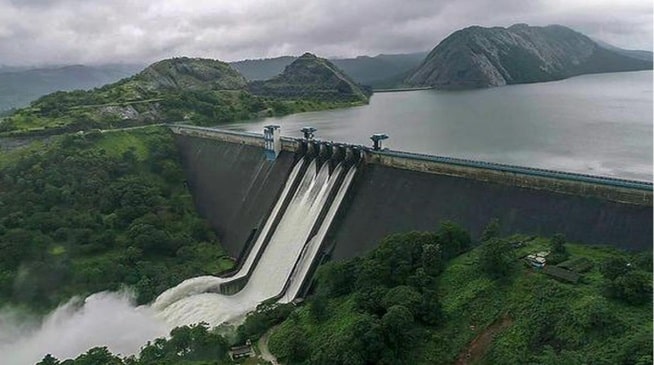What’s in today’s article?
- Why in news?
- Dam Safety Act
- What are the provisions of the Act?
- What are the challenges?
- How is dam safety undertaken?
Why in news?
- India has almost 6,000 large dams and about 80% of them are more than 25 years old and carry safety risks.
- A new Dam Safety Act (DSA) was passed in late 2021.
- On October 4, 2023, a glacial lake outburst flood (GLOF) in North Sikkim’s South Lhonak Lake washed away one of the biggest hydropower projects in India, the Teesta III dam at Chungthang.
- Reports have since revealed there were no early warning systems, no risk assessment or preventive measures in place as required under the Act.
What are the provisions of the Act?
- About
- The Dam Safety Act was tabled in the Rajya Sabha in December 2021, as a response to deficient surveillance and maintenance causing dam failure-related disasters.
- The Act listed key responsibilities and mandated that national and State-level bodies be established for implementation.
- Key provisions
- A National Committee on Dam Safety would oversee dam safety policies and regulations;
- A National Dam Safety Authority would be charged with implementation and resolving State-level disputes;
- The Chairman of the Central Water Commission (CWC) would head dam safety protocols at the national level;
- A State Committee on Dam Safety (SCDS) and State Dam Safety Organisation (SDSO) would be set up.
- Obligations of States
- Provisions require States to:
- classify dams based on hazard risk,
- conduct regular inspections,
- create emergency action plans,
- institute emergency flood warning systems, and undertake safety reviews and period risk assessment studies.
- States were asked to report and record incidents of dam failures.
- Until now, no statutory provision required systemic reporting of failures and no single agency was tasked with tracking this data.
- The CWC keeps a record but the list is not updated regularly.
- Provisions require States to:
- Punishment
- Failure to comply with any provision of the Act is punishable with imprisonment and/or fines.
- If such obstruction or refusal to comply with directions results in loss of lives or imminent danger, the entity shall be punishable with imprisonment for a term which may extend to two years.
- In February 2023, the Sikkim High Court ordered the Gati Hydropower Project company to pay ₹70 lakh to two widowed mothers, for non-compliance with the Dam Safety Act.
What are the challenges?
- Blind spots in both legislation and implementation
- The DSA does not promote risk-based decision-making and fails to incentivise transparency.
- The frequency and scale of such disasters reveal a pattern of neglect.
- Access of information
- A robust DSA should allow different stakeholders to access information easily, but India’s framework falls short.
- Dam safety is a public purpose function.
- Everything about dam safety, functions of all the institutions and committees and authorities, their reports, decisions minutes and agendas, everything should be promptly available to the public.
- However, nothing is in the public domain.
- A robust DSA should allow different stakeholders to access information easily, but India’s framework falls short.
- Lack of periodic review
- Periodic reviews are often not conducted or if they are, their findings are not easily available in the public domain.
- The Act requires dam builders to conduct comprehensive dam safety evaluations. However, there is no standardisation of how the failure is analysed and reported.
How is dam safety undertaken?
- Dam safety is a function of many parts
- This includes:
- designing and constructing dams that adhere to safety margins,
- maintaining and operating them per guidelines,
- recording data in real-time in an accessible format,
- forecasting hazardous events and instituting emergency plans, etc.
- This includes:
- Hazard profiling and regular assessment mandated by the Act
- Hazard risk fluctuates at the slightest touch, responding to climate change, urbanisation, and the way people/companies use water or where they are located.
- Periodic reviews are expected to bring forth fresh inundation maps and new rule curves (which determine the capacity of dam reservoirs).
- All of these contribute towards the safety of the downstream areas.
Q1) What is Central Water Commission (CWC)?
The Central Water Commission (CWC) is a technical organization in India that works in the field of water resources. It is an attached office of the Department of Water Resources, River Development and Ganga Rejuvenation, Ministry of Jal Shakti, Government of India.
Q2) What is glacial lake outburst flood (GLOF)?
A glacial lake outburst flood (GLOF) is a catastrophic flood that occurs when a dam containing a glacial lake fails, releasing a large volume of water.
Source: Does India need to relook the Dam Safety Act? | Explained
Last updated on March, 2026
→ UPSC Notification 2026 is now out on the official website at upsconline.nic.in.
→ UPSC IFoS Notification 2026 is now out on the official website at upsconline.nic.in.
→ UPSC Calendar 2026 has been released.
→ UPSC Final Result 2025 is expected to be released soon.
→ Check out the latest UPSC Syllabus 2026 here.
→ Join Vajiram & Ravi’s Interview Guidance Programme for expert help to crack your final UPSC stage.
→ UPSC Mains Result 2025 is now out.
→ UPSC Prelims 2026 will be conducted on 24th May, 2026 & UPSC Mains 2026 will be conducted on 21st August 2026.
→ The UPSC Selection Process is of 3 stages-Prelims, Mains and Interview.
→ Prepare effectively with Vajiram & Ravi’s UPSC Prelims Test Series 2026 featuring full-length mock tests, detailed solutions, and performance analysis.
→ Enroll in Vajiram & Ravi’s UPSC Mains Test Series 2026 for structured answer writing practice, expert evaluation, and exam-oriented feedback.
→ Join Vajiram & Ravi’s Best UPSC Mentorship Program for personalized guidance, strategy planning, and one-to-one support from experienced mentors.
→ Check UPSC Marksheet 2024 Here.
→ UPSC Toppers List 2024 is released now. Shakti Dubey is UPSC AIR 1 2024 Topper.
→ Also check Best UPSC Coaching in India


















